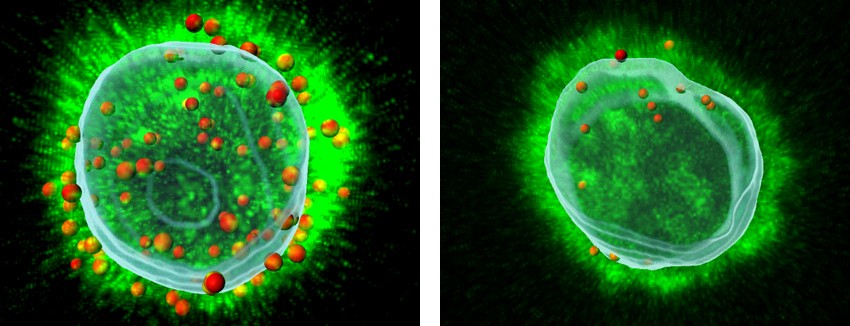
Drug Target Review: Pinpointing function in cancer T cells could be new immunotherapy
UC research has found that increasing a certain function in cancer T cells could mean a new therapy
A previously unknown T cell mechanism that could explain the reason behind decreased immune function in cancer patients has been discovered. According to University of Cincinnati researchers, their finding may present a new immunotherapeutic target for patients with head and neck cancers.
The study, led by Laura Conforti and Ameet Chimote, in the Division of Nephrology and Hypertension, UC Department of Internal Medicine, revealed that a reduced interaction between a molecule called calmodulin and the ion channel KCa3.1 in the immune cells of cancer patients plays an important role in the limited function of these cells. The team performed experiments on cytotoxic T cells taken from the blood of patients with head and neck cancer.
Featured photo courtesy of Laura Conforti and Ameet Chimote.
Related Stories
Before the medals: The science behind training for freezing mountain air
February 19, 2026
From freezing temperatures to thin mountain air, University of Cincinnati exercise physiologist Christopher Kotarsky, PhD, explained how cold and altitude impact Olympic performance in a recent WLWT-TV/Ch. 5 news report.
Discovery Amplified expands research, teaching support across A&S
February 19, 2026
The College of Arts & Sciences is investing in a bold new vision for research, teaching and creative activity through Discovery Amplified. This initiative was launched through the Dean’s Office in August 2024, and is expanding its role as a central hub for scholarly activity and research support within the Arts & Sciences (A&S) community. Designed to serve faculty, students, and staff, the initiative aims to strengthen research productivity, foster collaboration, and enhance teaching innovation. Discovery Amplified was created to help scholars define and pursue academic goals while increasing the reach and impact of A&S research and training programs locally and globally. The unit provides tailored guidance, connects collaborators, and supports strategic partnerships that promote innovation across disciplines.
Blood Cancer Healing Center realizes vision of comprehensive care
February 19, 2026
With the opening of research laboratories and the UC Osher Wellness Suite and Learning Kitchen, the University of Cincinnati Cancer Center’s Blood Cancer Healing Center has brought its full mission to life as a comprehensive blood cancer hub.
